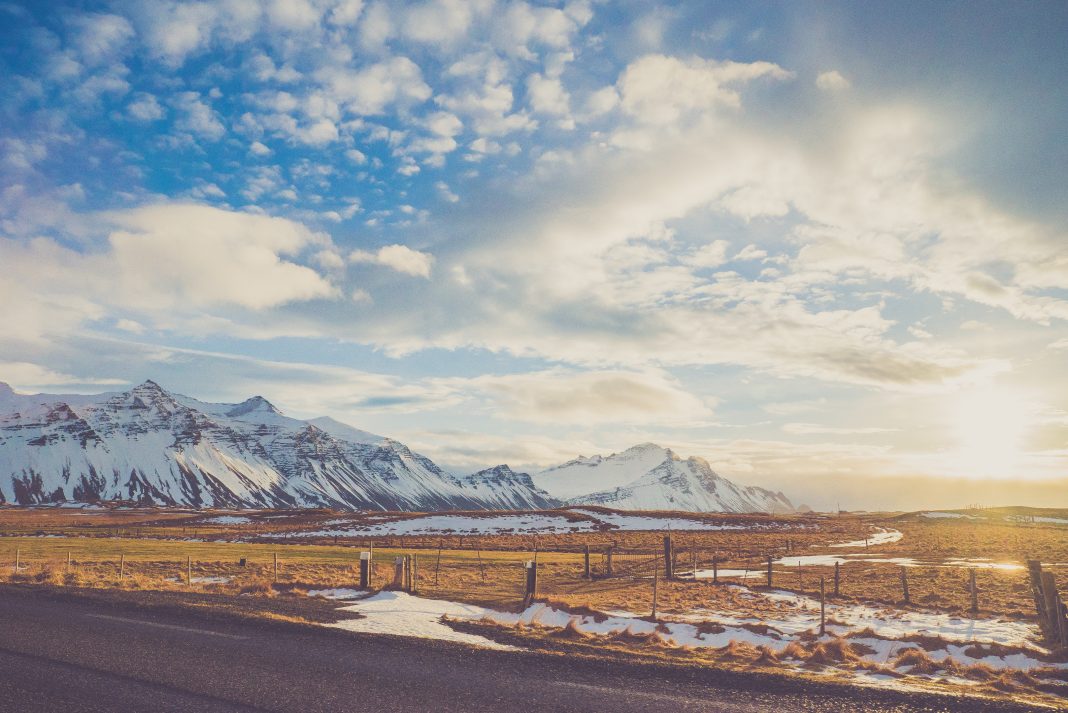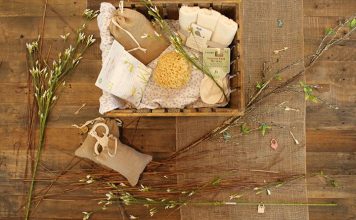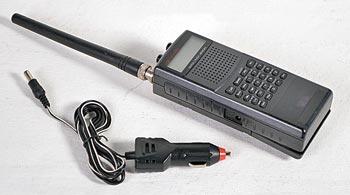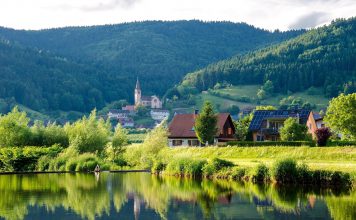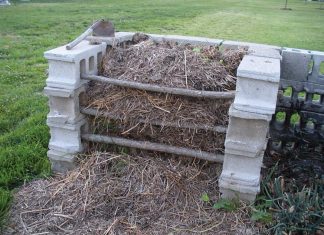| Issue #121 • January/February, 2010 |
My old friends from the Pacific Northwest think I don’t love them anymore, now that I’ve moved far away to the high desert.
It’s all a misunderstanding.
One after another, they say, “I’d love to come down and see you. How about in January?”
And I howl, “Oh no! Not January. Trust me, you don’t want to visit in January!” And they’re hurt.
Really, it’s not a lack of love. What’s happening is that they’re thinking “Desert… January… Mmmmm, a chance to be warm.” And no matter how much I warn that in this desert, it snows in January, and the pipes freeze, and the wind howls, and the roads become impassible…they can’t bring themselves to believe me.
They “know” the desert is warm in winter. It’s what they’ve always heard. So I’m obviously making excuses to avoid my old friends.
Truth is, they don’t “understand the music” of the high desert. And music can’t be explained; it has to be experienced. Every environment, from Minnesota to Maui, has its own musicits rhythms, its flow, its point and counterpoint, its grace notes, and its harmonies. Sometimes it has its dissonance or its clinkers, too. All the reading, photos, Discovery Channel programs, descriptions, or protestations of old friends in the world can’t substitute for experiencing a place.
In fact, to truly understand the music of a place, I think you have to be raised there. Or have some almost mystical connection between your spirit and the land.
I’m not so different from my northern friends. I wasn’t raised here and my one mystical connection to any land is to the NorthWET where I used to live. The desert will always be a foreign environment. I may admire or enjoy it. I may (and do) sometimes find it maddening. I’ll never fully understand it.
The mysteries of music
All my life I’ve “done” art and writing. My earliest memories are of drawing, reading, and playing with words. Art and the written word are my natural environment. But nobody in my vast extended family had a clue about music. Nobody played an instrument. Nobody sang, not even in the shower. Nobody ever went to a concert. Nobody even listened to recordings much. Later, in grade school I was given chances to learn to sing and play an instrument, but nothing “took.”
Today, toward music I feel only a vague, persistent longing. Every few years I pick up some new folk instrumentpsaltery, recorder, autoharp, etc.and play at playing. Each time I laboriously re-teach myself things my poor violin teacher tried to drum into us hopeless brats in the fourth grade. You know: Every Good Boy Does Fine. Then I proceed not to do so fine as that boy.
I get to the point where I might consider playing one or two songs in front of my best (and most merciful) friends. But I never progress any farther. Because even though I can put myself through the mechanics of learning music, I utterly fail to “understand the music” of music. I have no connection with music’s soul, with its deeper realities.
My hopeless longing toward the art of music helps me understand the longing people often express to me about writing or art. “I wish I had talent,” they sigh. They speak so wistfully. In my arrogant young days, I used to say, “Just do it!” Now I know better. Yes, through dogged labor you can become proficient at a lot of things, even things you don’t have a natural bent for. But some things are clearly gifts. They may come by nature or by nurture. But some people naturally “grok” math or music or color harmony or football. Others … nope. It’s a gift. Or it’s not.
I believe this same giftor woeful lack thereofextends to appreciating certain places.
You may have some profound connection to a location: A generations-deep connection to the rocks of Vermont; an old moonshiner’s craving for a secluded “holler” in eastern Tennessee; an instinct for prowling the canyons of Manhattan. No matter where you go, every other land will be measured against that land, that town, that scenery, those waters, those people, those glittering fountains, those Amish wagons, those high-rise buildings, those fields of tulipswhatever.
Of that place, that one place, you “understand the music.” If you are truly a fortunate creature of the world, you may feel at home on both tropical beaches and Antarctic research stations. (I have friends who are like that.) But even most people of that sort still have an image of one place to which they are most connected and attuned.
For me, no matter how long I live here, I will not understand the music of the high desertany more than I understand the music of music. I admire the place and am glad to be among the people. But I’ll be an exile as long as I’m here.
Exile? Good grief. Such over-the-top melodrama. You’d think I’d been driven out of my homeland by pogroms or plagues, not merely driven across country by property taxes. But there it is. We writers are entitled to drama-queen it because it makes writing more interesting. I think it says so right on the back of our poetic licenses.
But even as I struggle to feel at home, I admire the structure of a land whose music I’ll never fully understand. I have to learn that that ubiquitous shrub with the parchment-stiff pale yellow blossoms is “salt brush” or something like thatsomething every native desert child would have been born knowing. I have to think twice when encountering a snake: good snake or bad snake? Or bad snake that should be left unmolested because…well, there are no entirely bad snakes, only ones that are dangerous in some circumstances.
I understand the desert’s music a little bit better than my friends who haven’t experienced it, but will never truly hear it. Not in my soul.

And about this desert-in-winter thing …
If the desert feels foreign in summer when the dogs dig holes under the trailer and pant the day away and the rattlesnakes slither across the plaza at night…in winter, it’s as bizarre as a residence on the Moon.
Winter is formidable, dreadful, a colossal pain in the backsideand awesome.
This isn’t the first winter I’ve spent at the place that has come to be known as Last-Chance Gulch. I did the freezing-pipe/wind-piercing-the-trailer routine for four months a few years back as a visitor. But this is the first winter I’ve been responsible for anything beyond keeping myself and my dogs from becoming icicles. The other residents at this commune-that-isn’t have declared me to be the Keeper of the Inverter (the Frankenstein monster at the heart of our off-grid power system).
Never mind that I know nothing about inverters. Or electricity. Or photovoltaics. No matter that the more I study, the less I know. I’m the person most willing to poke at the inverter’s millions (possibly billions) of mysterious settings in an attempt to keep the power alive.
This effort is often in vain. Yesterday was cloudy and the solar panels barely squeaked out a charge. Before bedtime, I cranked up the generator and gave our tiny battery bank all the juice it would hold. I slept the sleep of the innocent, confident the power gods would, for once, bless us until morning. By 3:00 a.m., the batteries were as useful as doorstops and I spent the rest of the dark, and very cold night, wondering what was wrong and preparing to give the other Gulch residents holy heck for runningI don’t know, power drills or bread-makers or microwave ovens or Large Hadron Colliders all night.
What was wrong was…er, me. It was the first truly cold night of the season. And in its valiant attempt to keep my trailer at 50 degrees, my very own heater (propane powered but with energy-gobbling electric fan) sucked much of that newly injected juice out of the batteries. And left me freezing to boot.
(Oh, you city folks who think you’ll just move out to the country, set up a couple of solar panels and live happily ever after, have you got some bitter lessons comingunless you come with money or savvy enough to build yourself a SuperSystem.)
And then there’s the phenomenon of the frozen front door. I’ve mentioned this before. But I didn’t tell you it comes with its own personal Catch-22. Trailer doors are metal, you know. And they’re not the most tight-fitting doors conceived by the skill of mankind. Snow and frost sneak in under cover of darkness. In the morning, you go to open the door and…ugh, thud, push, shove…door doesn’t budge. Meanwhile dogs are staring up at you with that “But Mom, you know we can’t use the people-toilet” look.
The Catch-22 is that the door can be opened only when its joints are heated by a hair dryer. And the hair dryer requires three metric tons of electricity per second. And the electricity…well, it’s all locked up in the generator. Whichof courseyou can’t get to until after you’ve used the hair dryer to open the door.
The dogs, understanding none of this, try their best to cross their legs and be patient.
At that point I use the cell phone to call The Guys. And The Guys (other full-time residents of Last Chance Gulch, who I’m convinced can fix anything short of the Bush-Obama economy) come over in their bathrobes and rescue us.
I could tell you about the time I attempted to unfreeze a spigot under the trailer by judicious use of a propane burner. I could tell you how I sat and watched and waited and tested and the spigot never unfroze. I could tell you how I went back into the trailer and came out a bit later to find that the ice was still frozen absolutely, antarcticly solid in the pipes and joints but the metal spigot had melted into a silver-dripping blob. I could tell you my resulting theory that the desert water (which I believe is solid calcium and sulfur, lightly mixed with spit) makes ice that’s stronger than steel and could be used to build bridges.
But I won’t tell you all that. It would lead to a host of other thawing-freezing-bursting stories that would depress me to tell and bore you to read.
So sensible people (outside of Minnesota and Alaska, where they think all this is wimpy stuff) are now asking something like, “Claire, why did you move to this godawful place?” Or at least, “Wouldn’t a month in Tahiti make more sense, right about now?” The answers to that are “Property taxes” and “Yes, will you buy me a ticket?”
But really…there’s high-desert winter (groan and grumble) and then there’s…Ah…high-desert winter.
Have you ever seen sagebrush and junipers (and even that infamous salt brush) thick and white with hoarfrost on a still February morning? Have you ever watched the sand and rocks sparkle in a shiny vista that stretches for endless miles?
Have you stood in the cloud-lit night and watched snowflakes as big as dinner plates drifting down on teddy-bear cholla and yucca, coating the spines of the prickly pear? I have, and it makes all the rest worthwhile.
And the desert sky…oh my. I’ve told you before about the desert sky, but words are useless.
And when the weather blows and your fellow Gulch residents all crowd around one tiny trailer table for a dinner of beef stew and cheese biscuits, then you really know what it’s all about. The tiny trailer stove heats the tiny trailer space as it also cooks the stew. The windows fog, then ice over in fairy swirls. And everybody relaxes and laughs and gets warm from the inside out.
In cities, and in warmer places, winter doesn’t much matter. Even in Minneapolis, happy Minneapolitans go from place to place via covered, heated skyways that are filled with plants, splashing fountains, and cozy comforts even in January. The hectic pace of life goes on. Here, winter is what winter was to our ancestors.
It’s the time when all those neighborhood barn-raising (and roof-raising and foundation-pouring) projects are overor at least halted for the season. It’s the time when the garden (such as it is) sleeps and makes no demands. It’s the time to huddle and read and wear bunny slippers (well, okay, maybe our ancestors didn’t wear bunny slippers; but they probably wish they could have). It’s the time (and this year I really mean it) when the other Gulchers will play poker with me whether they really want to or not because when it’s cold outside and warm within, poker takes on an added dimension of pleasure, completely aside from the predatory delight of taking nickels and dimes from my friends.
And once again I come down to something it always seems strange for my hermit self to say: People are the best thing about winter. People to cook with and laugh with. People to haul my truck out of a muddy ditch or haul me out of a frozen-shut trailer. People to share comfort and warmth with when comfort and warmth are in short supply.
And how’s that “pooling resources” thing going?
That brings me to something I wrote about here not long ago. A few months ago, I chronicled our early effort to pool our resources while we eased new people (including yours truly) into Last Chance Gulch. Some folks (including BHM editors, whose wish is always my command) have asked me how that’s turning out.
Because winter, with its cabin fever and its fast-disappearing battery power, can be a trial for a little Gulch community, this seems a good time for an update.
The short answer is that for the most part things are working well. At least, sharing resources hasn’t led to any disastrous breakdown of our little society or any irreconcilable differences between its members.
We collaborate on each other’s projects. We’ve had two house-raisings since I got here, as well as helping neighbors hoist 100+ rafters on their amazing house-to-be. We’ve worked on projects that should help us all be more comfortable, like the soon-to-be upgrade of the solar power system. We still gather for communal meals twice a week, though we’ve relaxed our slavery to the calendar a bit, since schedules don’t allow us to fulfill our obligations every time. Our pooled food hasn’t succumbed too horribly to the Tragedy of the Commons, although the canned chili from the grocery store is disappearing noticeably faster than the dried lentils from the Mormon supply store.
And here we come back to some qualities of music. We live in harmony, with little dissonance. And one of the secrets to our harmony is…improvisation.
Quite simply, we broke a lot of rules and temporized considerably when we put this casual community together. Our community is no well-planned, carefully structured symphony. It’s more like a jazz jam. With musicians who’ve never played together before. And a few who don’t even know how to play at all.
To build a community the “right” way, we should have laid down rules. We should, for instance, have had a rule about how much stored food everyone was required to bring. We didn’t even ask anybody to show up with so much as a can of beans.
When inviting people to join us, we should have chosen for necessary skills. Heaven knows an electrician with off-grid experience would have been nice. Not to mention a horticulturist or a small-animal veterinarian. We didn’t do that, either.
We didn’t even stick to our one big original rule about participants proving their commitment by purchasing their own land parcels. We didn’t set deadlines and stick to five-year plans. If there’s an established decision-making process around here, I never got the memo. In short, we did EVERYTHING wrong. Last Chance Gulch should have died aborning. Or died sometime in the years since the project (such as it is) began. Last Chance Gulch has known disappointment, delay, disaster, and even death. Yet, in all its improvised and occasionally off-note glory, here it is.
We must have done something right. I ponder, “What was it?” And I can only conclude that (aside from more than a little bit of luck) it’s actually our amateurish improvising that’s enabling things to go right.
The people who are making it here either understand the music of the desert or have an instinct for improv. To put it in other terms, they’re flexible and adaptable. They’re able to take the desert’s simple melody line and weave their own personal harmonies around itthen weave their personal harmonies around others’.
One was raised in a similar climate, though with more amenities. He’s creative, cheerful, very smart, and he works like a Helot. One came here as a charity case. Yet with his mechanical aptitude and endless willingness to pitch in, he’s become (in my humble opinion), the Gulch’s most valuable asset. If we’d required him to turn up with a year’s supply of food or buy his own land, we’d never have gotten him. One prefers to spend most of her time in civilization. But she sends money and brings us Costco bounty; we like that.
Me, I don’t know exactly what I’m good for. But I’m buying the power system upgrade with the money from the sale of Cabin Sweet Cabin. And on snowy winter days, I do make one hot, steamy, delicious beef stew.
Getting with the rhythmor not
With one exception, everybody who came here arrived with (and quickly shed) some fanciful ideas about what life here would be like. Two thought they’d be able to earn enough money locally to finance their house-building projects. Both ended up earning money elsewhere, bringing it back here, building a while, then departing again to earn more. Our newest members, who haven’t begun their homes yet, have romantic visions of building very hands-on, labor-intensive “green” homes. We wish them well but won’t be surprised if they hit a hard-work wall and eventually opt for something simpler or more conventional.
When I spent my first winter here, I arrived with the fantasy notion that I could live all season in a tent. Before the first week was out, the desert wind had ripped my little nylon houseand my illusionsto shreds.
To thrive in the high desert, especially in winter, you must listen to the music of the land and sway with it, even if you can’t tell a treble clef (or a cholla) from a tremolo (or a collared lizard). Same with thriving in community. You must adapt to its rhythms and add your own harmony.
Not everybody would want to. Not everybody can.
There are people who, you just know, are never even going to learn the music of this land, not even at a “Twinkle, Twinkle, Little Star” level. Take the New Jersey woman who recently called one of our locals.
Some time ago, she bought a 40-acre parcel sight-unseen for a mere $12,000 or thereabouts. Cheap, remote land is common in the West, where vast ranches are broken into acreages and marketed over the Internet to hunters and dreamers for LO down payments and EZ terms. Many of the distant purchasers soon default and the developer makes money all over again by reselling the parcel. Sometimes four or five times. There’s nothing dishonest about the practice; in fact many of the developers are quite honorable and upfront about the perils and pitfalls and lack of amenities. But some folks have a tin earor just don’t want to listen.
Anyhow, Ms. New Jersey bought her stunningly inexpensive acreage some years ago, hung onto it, and now she’s ready to plan her cozy desert retirement. In homeowners association documents she found the phone number of one of her nearest neighbors, Terrance, and gave him a call.
“Who do I contact to get my water line?” She wanted to know, “and how do I arrange for electrical and sewer hookups?”
To say Terrance was dumbfounded would be an understatement. “Do you realize you’re five miles from the nearest county road?” he asked her, “Don’t you know that the only ‘utilities’ here will be your own well and your own wind or solar power system?”
No. She did not understand thatand wasn’t about to. Such impossibilities didn’t fit her urbanite frame of reference, where all of civilization’s goods are a mere phone call away. She kept asking variations on the same theme, hoping for more melodic answers.
“And,” Terrance continued, no doubt relentlessly, “do you understand that your property is on a mesa and that the reason you got it so cheaply is that you’ll have to cut a driveway through half a mile of solid rockand you’ll still only be able to access it by Jeep?” (Terrance knows; his own hand-cut driveway is a terror and the talk of the neighborhood.)
But no, these things Ms. NJ did not intend to grasp. She ended the call still uncomprehending. She was tone deafwhen she bought the place, and no doubt forever.
I’ll bet she also thinks it’s 80 degrees in January here. Because…well, you know…it’s the desert.
One of the young men who lives hereabouts says he hopes she does think that. After Terrance’s tale made the rounds, the young man said he hopes Ms. New Jersey shows up in winter wearing shorts and a halter top, ready for her snow-birding southwest experience. Because on that day he plans to meet her with $2,000 in hand and acquire himself an ideal piece of property, Real Cheap. To him half-mile rock driveways and howling mesa-top winter winds are all just part of the high desert’s strange, and strangely beautiful, symphony.


